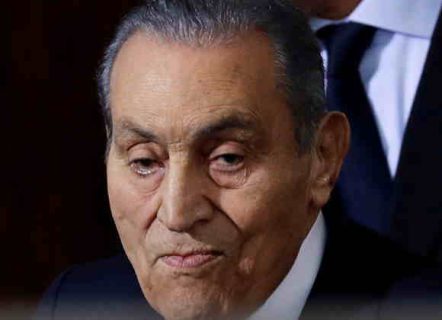Egypt’s accidental president

Mubarak may have been deposed, but his legacy largely lives on under iron-fisted military rule.
The Egyptian authorities reacted to the passing of former president Hosni Mubarak by declaring three days of national mourning, while the military establishment hailed him as a hero of the 1973 war (when he commanded the air force). But the general public has different and conflicted feelings. Most Egyptians saw Mubarak as a corrupt dictator who favoured the business elite throughout his 30-year rule, enshrining the marriage between money and politics while making life worse for the poor and downtrodden majority, as well as contributing to the destruction of Iraq by supporting the war against it. No wonder they rose up against him in their millions in the 2011 revolution led by Egypt’s youth, who had become fed up of seeing their country’s riches looted and their freedoms and public services eroded.
The corrupt business class cut Mubarak off entirely from the mass of the people and persuaded him to bequeath power to his son Gamal, who acted as its spearhead and was captive to its corruption. It is to the military establishment’s credit that it rejected this planned succession and the dominance of the business class and moved against it, though it later overturned all the jail sentences handed out to Mubarak and his sons and senior acolytes for corruption and the killing of 800 young people during the revolution.
Mubarak became president by accident, assuming office after the assassination of President Anwar Sadat in 1981. Sadat’s assassins could also have shot Mubarak when they attacked the podium on which both men were standing. But they did not, because they did not consider him important. Yet he went on to consolidate power and carry on Sadat’s legacy, both in terms of normalisation with the Israeli occupation state and of pursuing policies that impoverished the majority of Egyptians. It was no surprise that he was eulogised by Benjamin Netanyahu, who lauded his time in office and hailed him as a faithful friend of the Zionist state.
Mubarak went on to survive six assassination attempts, the most serious at the 1995 African summit in Addis Ababa by an extreme Islamist group backed by Sudan’s then-president Omar al-Bashir, who is currently jailed on corruption charges.
Opponents may rightly argue that after the revolution, Egypt witnessed a democratic transformation that brought to the office an elected president whose honesty and transparency was acknowledged by all. But he barely survived in office for one turbulent year, after which the military exploited the popular protests of June 2013 to seize power directly.
Mubarak’s supporters, who have resurfaced in a big way in recent times, berate his critics by boasting that he achieved stability and security and successfully restored Egypt’s ties with the Arab world that were severed after the signing of the Camp David accords. But how valuable is stability when it is imposed by an iron fist in the absence of democratic reforms, greater freedoms, judicial independence, fairer distribution of wealth, social justice or action against corruption?
Egypt’s current rulers are largely following in Mubarak’s footsteps, employing the same iron fist approach in the name of maintaining the security and stability needed to achieve economic development and improve living conditions and services for 100 million Egyptians.
The majority of Egypt’s people have learned to be pragmatic and forbearing. Security and stability do matter to them, having learned the lessons of what happened in other countries like Syria Libya, Iraq and Yemen. That does not mean they believe predictions that Egypt is on course to develop into the sixth biggest economy in the world within the next 15 years. Rather, they watch and wait. Like a great elephant, they can be docile and contain their anger, but once they charge they can sweep away everything in their path. That is a fact Mubarak saw too slow to appreciate, and as a result, became the first Egyptian president to be put in the dock on charges of corruption and murder.
Yet the military establishment was and remains Egypt’s true ruler, whether during the Mubarak years or under the current president Abdelfattah as-Sisi. It has the first and final say, and God only knows when or how that state of affairs may change.
https://www.raialyoum.com/index.php/egypts-accidental-president/
 TheAltWorld
TheAltWorld 
0 thoughts on “Egypt’s accidental president”